Tips For Improving Digestion and
Minimizing Gas and Bloating
This article features tips for improving digestion and minimizing gas and bloating, common complaints among many Americans, including those eating a higher fiber, whole-foods, plant-based, vegan or macrobiotic diet.
Don and I were vegan for five or so years, from late 2011 through about 2016, when we 'jumped ship' believing that our diet was causing us diminishing health. One of our main complaints was ongoing digestive problems. Don had a lot of gas. We both had on and off bloating and abdominal pain, and I was still dealing with irregular elimination, with cyclical occurrences of constipation. This seemed odd, given the high fiber intake.
We certainly would have benefited from an article like this sharing tips for improving digestion back then! Had we done our due diligence and made some simple tweaks to our diet then, we'd be now celebrating nearly 13 consecutive years as vegan right now!
In a nutshell, it's the food, but so much more.
How we eat, meal frequency and regularity, food combinations, use of spices, the right forms of exercise and movement, and managing stress and emotions ~ especially around meal time ~ all play a role in digestion, and will be touched upon in the tips for improving digestion and minimizing gas and bloating, below.
For more information and resources, you may also want to read How To Minimize Gas and Bloating ~ Recent Meals with our Vata Reducing Dietary Revisions on my blog.
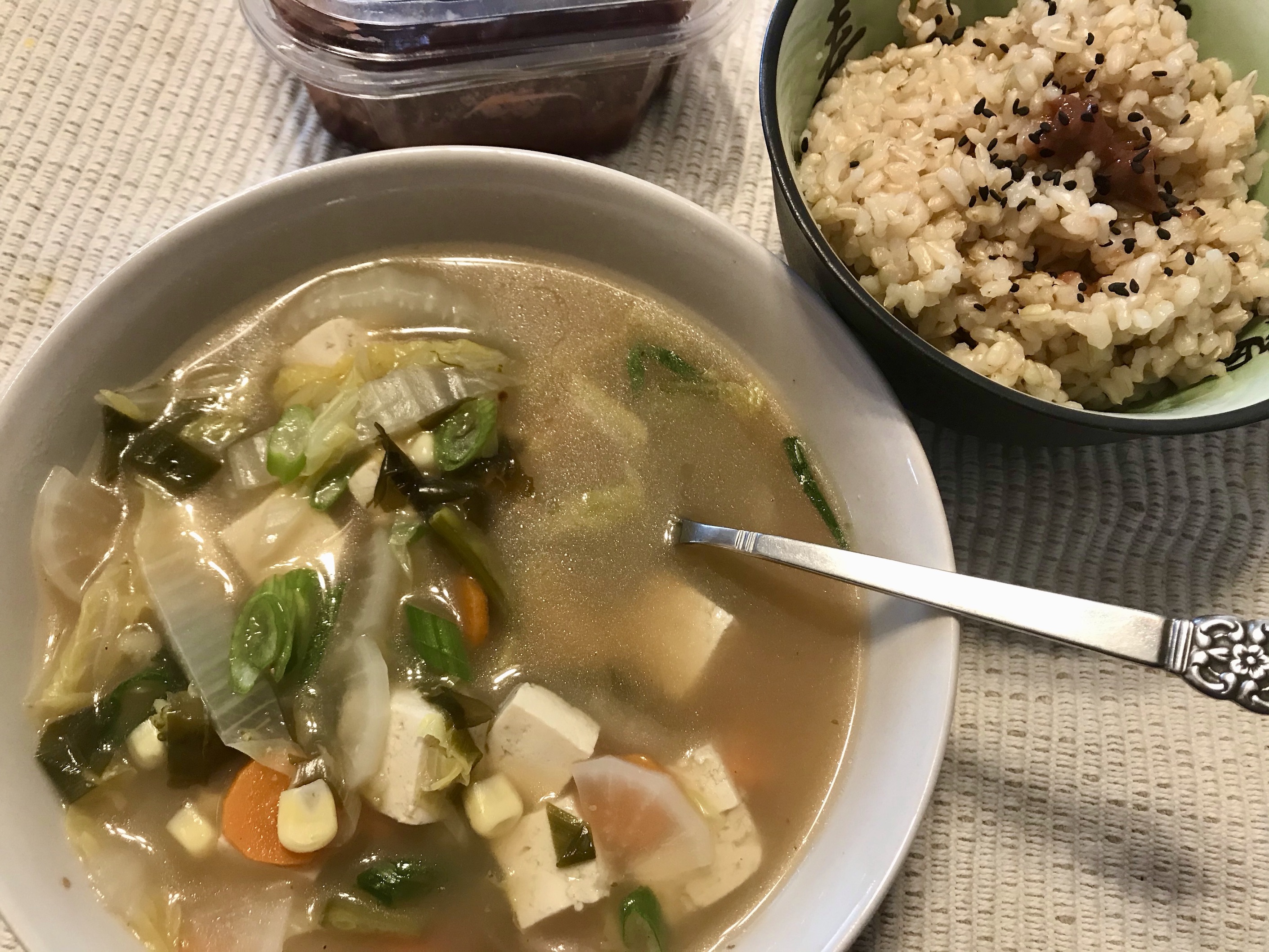
We both are very familiar with the discomforts associated with poor digestion, gas, bloating, and irregular elimination. In my experience, it takes some time to resolve, and requires a multi-tiered approach.
That said, since restoring a whole foods, plant-based vegan / macrobiotic diet, we have been determined more than ever to heal our gut, rather than blame the foods. 'Seeds' ~ especially whole grains, but also seeds, beans, peas, and legumes ~ are foundational foods which nourish our health, vitality, immunity, and our essence.
We've been experimenting as we return to our roots in Asian medicine practices, including Chinese food therapy and Taoist Five Elements practice, along with Ayurvedic medicine while applying the dietary structure of a vegan macrobiotic diet.
Since I have had a near lifetime issue with on and off constipation, I'll include some tips here for improving flow, with more specific tips to come in a separate post. This issue involves much more than just diet.
The rest of this article will focus on the top tips for improving digestion that we have ourselves implemented with good success.
So, let's get right to my top tips for improving digestion and minimizing gas and bloating.
My Top Tips For Improving Digestion & Minimizing Gas & Bloating
In Ayurvedic Healing, A Comprehensive Guide ~ a book I highly recommend ~ Dr. David Frawley writes:
"Most diseases arise from poor or wrong functioning of the digestive system. The digestive fire, Agni, is central to health. It's not only responsible for absorbing nutrients in food, but it also destroys any pathogens and renders the food acceptable to our systems. Undigested food becomes like a pathogen in the body, breeding toxins and upsetting the immune system."
He further states, "When Agni is normal there is good digestion, circulation, and complexion; pleasant breath and body odor; adequate energy and strong resistance to disease. When Agni is abnormal there is poor digestion, poor circulation, bad complexion; offensive body odor, intestinal gas, constipation; low energy and poor resistance to disease. Therefore, treating the digestive system––regulating Agni––is a radical (root) treatment for most diseases."
The digestive fire, Agni, can be too high, too low, variable, or balanced.
Balanced Agni is reflected in a normal, healthy appetite, easily satisfied with natural foods that are not strongly spiced, with regular bowel movements, and little production of gas and bloating. There will also be accompanying clarity of mind and senses.
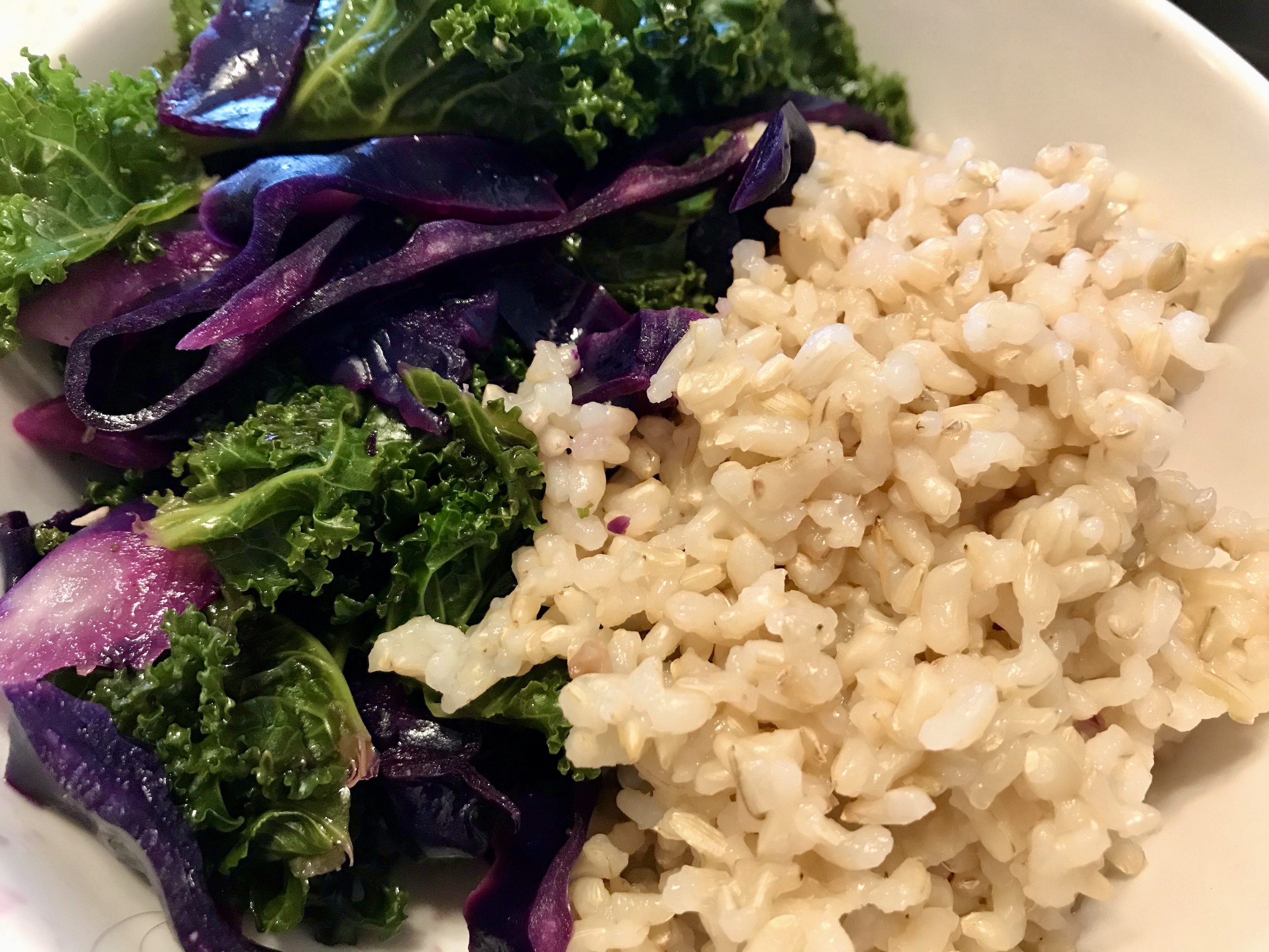
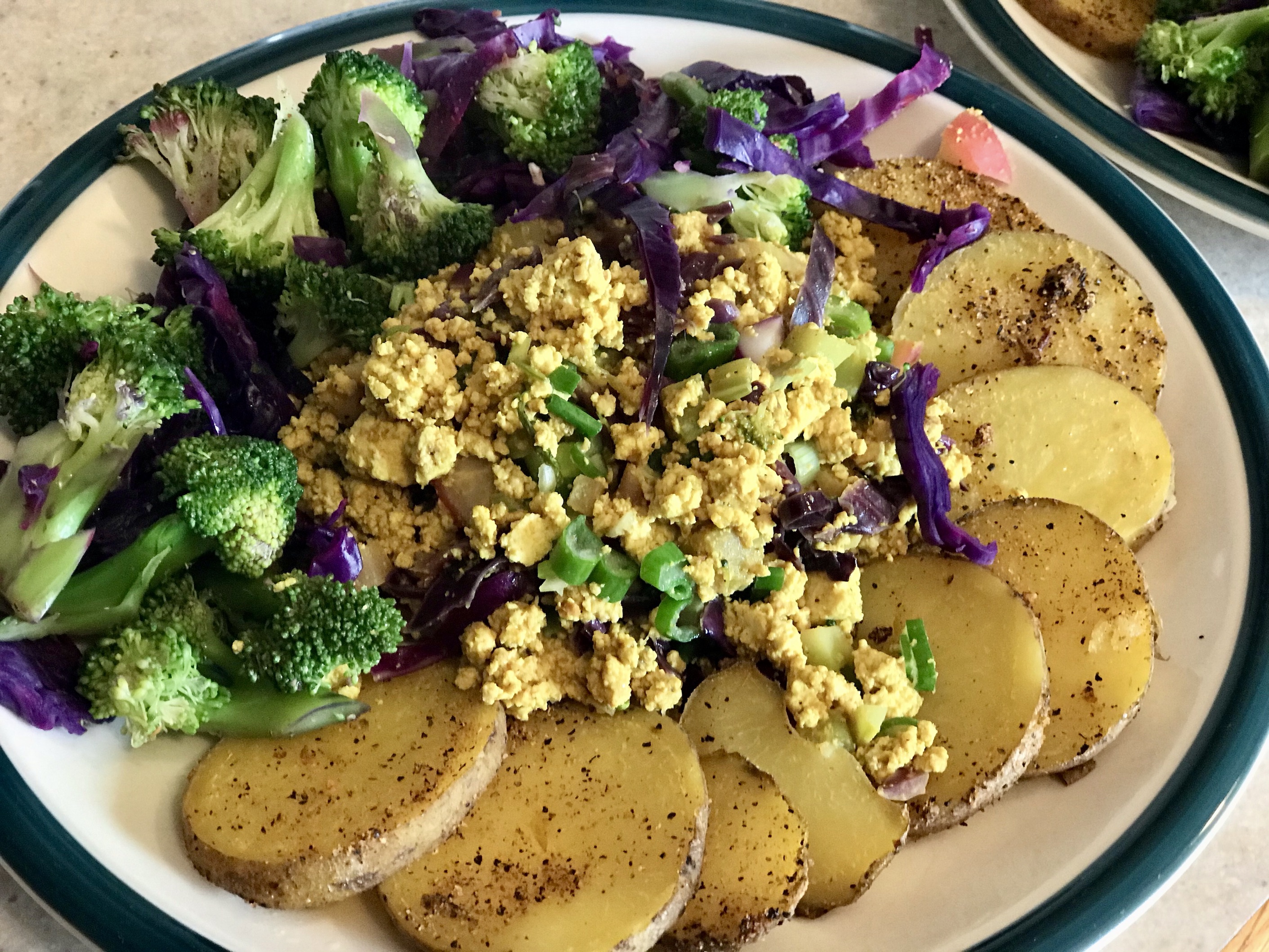
A Few Preliminary Tips for Improving Digestion to read first
- Top tip: Have patience! Improving digestion takes time!
- Make incremental changes, at least to start. It's hard to know what works, and what doesn't when making too many changes at once.
- Keep a food diary, tracking symptoms + timing of them relative to meals.
- Keep a positive mindset. Use the power of your imagination to see yourself having improved digestion and optimal health!
- Remain neutral. Our mind is quick to jump to conclusions about which foods are triggering symptoms, based on previously held beliefs, which may be flawed. Bloating experienced immediately after one meal is likely being caused by something, or a combination of foods, consumed at an earlier meal.
- Be mindful of how stress & emotions are impacting your digestion. Stress, tension, or eating on the run, in hectic environments, or after having an argument will ALL effect digestion!
Tips for improving digestion ~ based on the preliminary tips
- Take a deep breath. An excellent tip is to take several deep belly breaths in the morning, ideally while squatting, and sipping heated water, which I explain further, below.
- Start learning to un-learn! The mind is sooo full of beliefs (and, BS) about what is good for us, what isn't. These are usually just things we've heard circulating, whether or not they are true, or valid for us. Letting go of preconceived ideas about which foods are good for you, and which are not will free your mind for more divine inspiration to guide your way to improved digestion and health!
- Be Mindful at meal time! Turn off the t.v., and eat in a more peaceful environment. Avoid eating in a rush as much as possible. Don't eat after an argument, while distracted, or when feeling stressed. Try to avoid looking at social media, reading, or distracting yourself. Keep conversation minimal, or at least pleasant.
- Chew your food well! Place your awareness on the process of chewing your food, and note the change of flavor as foods, like whole grains become very sweet when well chewed.
Physical, Logistical & Dietary Tips For Improving Digestion
Physical Tips for Improving Digestion
- Drink some heated water, or at least tepid (NOT cold) first thing in the morning. You can add lemon or lime if you like! Sip while squatting. Breathe deep into the belly, 7-10 times. (Photo, Far Left)
- I like to follow this with several side bends, a variation of Urdhva Hastasana, which translates to 'raised hands pose.' Stand in Tadasana, Mountain Pose, feet hips width apart. I like to put a foam yoga brick between my legs, just above my knees, to squeeze the brick, activating my upper leg muscles to keep them strong as I do the side bends. Raise your arms out in front of you, lock your fingers, then turn your palms to face out. Raise your arms above your head as you rotate your shoulders, upper arms towards your ears. With strong legs, upper thighs lifting your knees, bend first to the right, then to the left, or vice versa. When your hands are above your head, take in a good belly breath. As you bend, exhale. Try to do 5-10 per side.




- According to Chinese medicine, there are several digestive channels on the legs. Therefore, standing, walking and squatting helps activate the digestive channels. Taking a walk 15-30 minutes post meals, and squatting while sitting at the toilet are both helpful tips for improving digestion, and elimination. Try putting your feet up on a collapsable stool you can keep near the toilet. Bend forward a bit, breathe, relax, and imagine the flow...(I found the perfect collapsable stool at Aldi.)
- Contrarily, sitting for extended periods can contribute to poor elimination. Possibly switch to having a standing or moveable desk to change positions throughout the day.
- Be mindful of your posture, especially if you spend long hours sitting. Too much sitting in the same position can also impede digestion, and lead to low back pain or stiffness
- Good sleep habits improve digestion. The body needs adequate 'Qi' ~ vitality ~ to perform all its functions.
- Sitting twist yoga poses or twisting to one side while in a lunge position may also help stimulate the internal organs, like the liver and gallbladder, which may help improve digestion when practiced consistently.
- Any exercise or lifestyle habits that help you feel more relaxed and at ease help improve digestion. That may include getting acupuncture treatments, which can be quite beneficial for stimulating the digestive juices, and strengthening the organs of digestion. Massage may help as well.
Logistical Meal Timing + Frequency Tips for Improving Digestion
- If you are eating only one or two main meals per day, experiment with adding a third, small meal or snack. Or, if you tend to eat a big breakfast, experiment with having a light breakfast, a decent sized lunch, and a moderate last meal. Contrarily, if you snack a lot, make sure you eat enough at each meal.
- In general, if digestion is weak, you may need to adjust the quantity of food consumed at each meal. I found that after doing diets which promote an 'eat until satisfied', and/or one meal per day type approaches caused me to inadvertently train my stomach to over eat. I would try to 'eat enough' to be satisfied for hours, believing that was a sign of better blood sugar balance, and digestive health. Boy, was that a bad approach, at least for me! Some people may be fine eating that way, others may not. I still primarily eat two meals, and a snack. It has taken me some time to find what works best, and learn to eat until just starting to feel full, versus suddenly feeling overly full. I've found it helps to have one main meal that I take more time to prep, while the other meals tend to be quicker to prepare.
- Try to eat all your food as early in the evening as you can pending your schedule. It's okay to feel a tad hungry before bed. Giving yourself at least a 12 hour window between your last meal of the day, and first meal the next day helps with improving digestion. In Traditional Chinese medicine it is recommended to eat during the times when the digestive organs are strongest, between 7-9 AM, or between 9-11 AM. Also, it's best to not eat after dark, and to eat at least 3-4 hours before bedtime.
- Keep meals simple, with fewer ingredients until digestion improves.
Dietary Tips for Improving Digestion and Minimizing Gas & Bloating
According to Frawley, to improve digestion and minimize gas and bloating, "Simple and moderate eating is required: not eating too much, too frequently, or combining too many foods at the same meal. Sweet taste should be avoided or taken in moderation by itself. Spicy, carminative (gas-dispelling) herbs are indicated. These include cardamom, fennel, ginger, peppermint, orange peel, bay leaves and most cooking spices."
"Cardamom and fennel in equal parts are excellent for most indigestion, gas and abdominal pain, 1/2 teaspoon of the powder infused in one cup of water taken before meals."
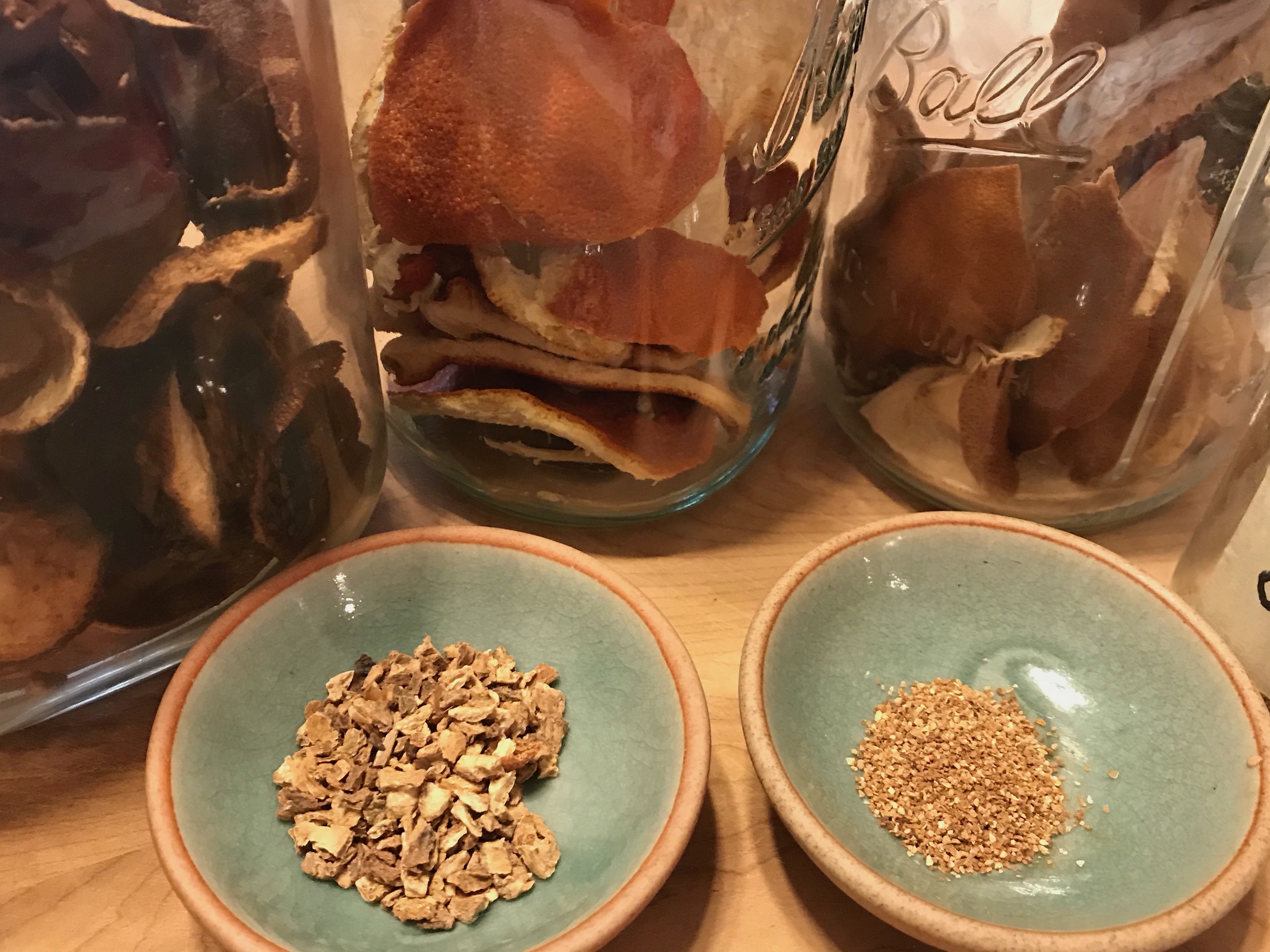
I like to simmer some sliced, minced, or grated and squeezed ginger in a pot with 2-3 cups of pure water along with 1-2 teaspoon of fennel seeds, several cardamom pods, and a teaspoon of coriander seeds and anise. Adding a slice of aged orange peel also stimulates digestion. The anise seeds sweeten the tea, but add additional sweetener if desired.
Following are several more dietary suggestions for improving digestion and minimizing gas and bloating.
- If experiencing gas or bloating, try regularly drinking ginger tea. Grate and squeeze ginger into a mug of heated water. Add honey if desired. Or make the Cardamom & Fennel tea mentioned above, or peppermint.
- Aged citrus peel and bitter herbs taken prior to meals may help stimulate bile flow and improve digestion for some people. This is especially beneficial for those with a Pitta constitution, who typically have a strong digestive fire, but may experience symptoms of hyperacidity and heartburn. Gentian, barberry, oregon grape root, katuka, are good bitter herbs, and fennel, coriander, cumin, mint and saffron are good carminative herbs for Pitta types.
- Those with a predominant Vata constitution need to minimize light, dry foods. If you tend towards having irregular bowel health, with dry constipation, and/or dry skin, along with insomnia, palpitations and/or nervousness, you will definitely want to try avoiding these types of foods for a while to see if digestion improves. The obvious light, dry crunchy foods include any type of potato or corn chip, pretzels, crackers, peanuts, and dry pastries and cookies. Other less obviously drying foods include excess salads, dried fruit, cabbages, beans, and raw onions. Most beans are light and dry, and promote wind (vata), so we have scaled way back on our bean consumption, focusing mostly on the smaller beans, such as mung or aduki beans, lentils, and split peas.
- Those with a Kapha dosha imbalance will want to avoid overeating, eating late at night, and consumption of greasy and oily fried foods. Hotter spices can be used, such as cayenne, dried ginger, ajwan, cinnamon, and clove. Kapha imbalances center around upper respiratory conditions, especially excess phlegm and congestion. In general, Kapha types should avoid dairy, and most animal foods. Beans may be better tolerated, however, be sure to cook them well. Soak first, then pressure cook with seaweed, adding spices before serving.
- Consume easy to digest foods, like soups. Miso Soup with vegetables, ginger and miso paste served with brown rice is a simple and easy to digest, classic macrobiotic meal. Whenever I feel off, this is my go-to meal. I stir 1/4 tsp. of umeboshi paste into the brown rice. I also enjoy eating the brown rice wrapped in a half sheet of nori. A little Korean fermented gochujiang, or other chile paste can be added for a little spice.
- Learn how to properly cook brown rice and other whole grains and beans for improved digestibility.
- Regular consumption of a small amount of naturally fermented vegetables or pickles with meals, and/or miso vegetable soups may aid digestion. Likewise, simple pureed carrot or other vegetable soups seasoned with ginger, fennel and the above spices are very soothing to the digestive system. Soups, especially miso soups are a regular component of macrobiotic diets.
- Increase consumption of (mostly cooked) greens and vegetables in general. (QB Greens & Veggies is a great way to batch cook them, and incorporate more into your daily meals.)
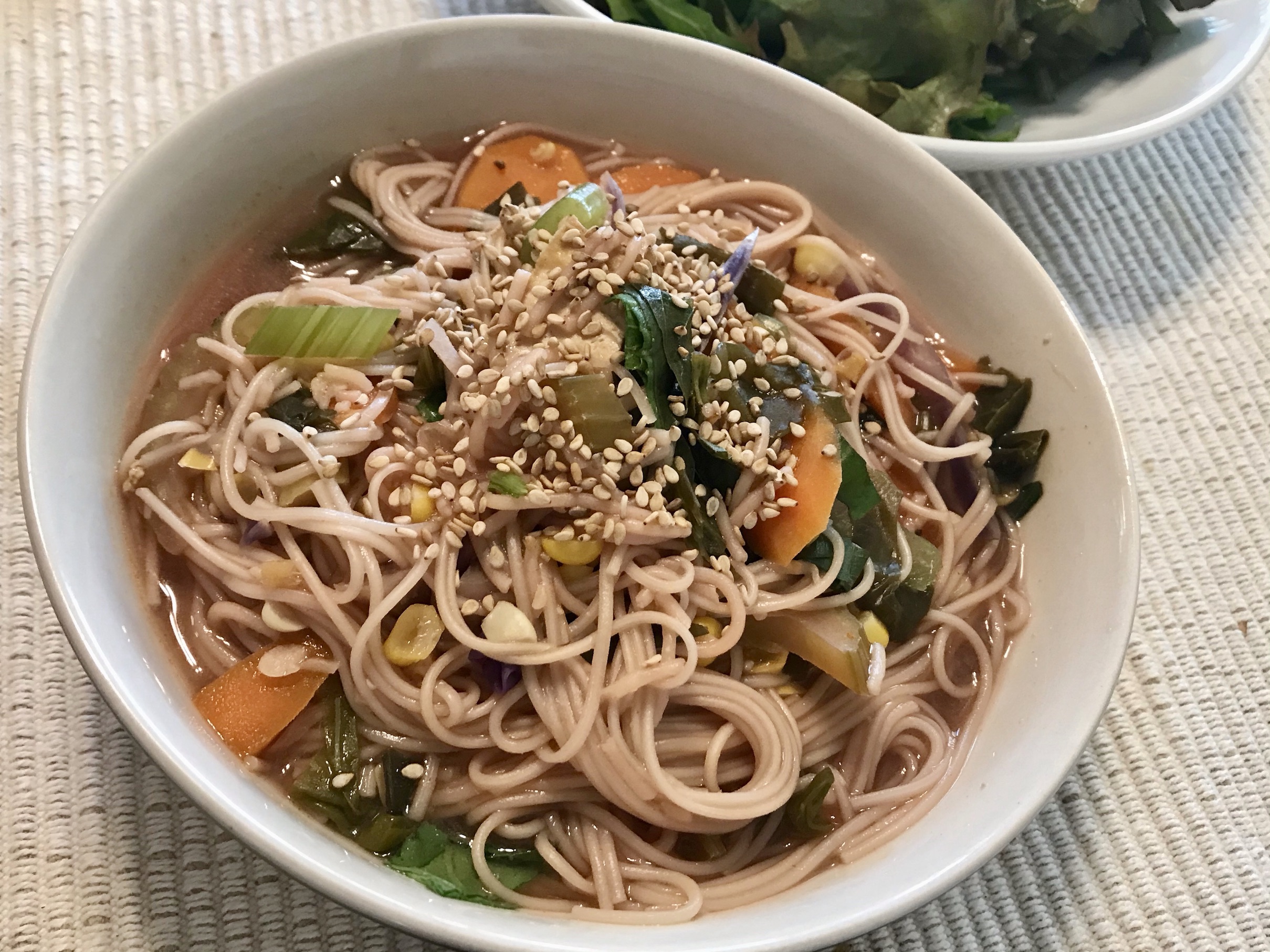
Another tip for improving digestion and minimizing gas and bloating centers around food combining. This is going to require keeping a diary to determine which combinations of foods don't seem to work well for you.
For example, in Ayurvedic medicine, it is recommended to not consume acidic foods, like tomatoes and tomato sauces, or salsa with starches. This is a very common combination in a lot of ethnic cuisines! Think spaghetti and marinara, pizza, chips and salsa. This type of combo may or may not be a problem for you, but it's worth considering, especially if you tend to consume a lot of tomatoes or tomato sauces with starchy foods. Most fruits may be best consumed before main meals, without many other foods.
According to Ayurvedic medicine, sweets in general should be consumed at the beginning of the meal, rather than afterwards. Reminds me of the saying, "Life is short, eat dessert first!"
Keeping meals as simple as possible was mentioned above, but bears repeating. I enjoy more complex meals and flavors, but always feel best eating simple meals ~ a few main ingredients, simply spiced and simply prepared.
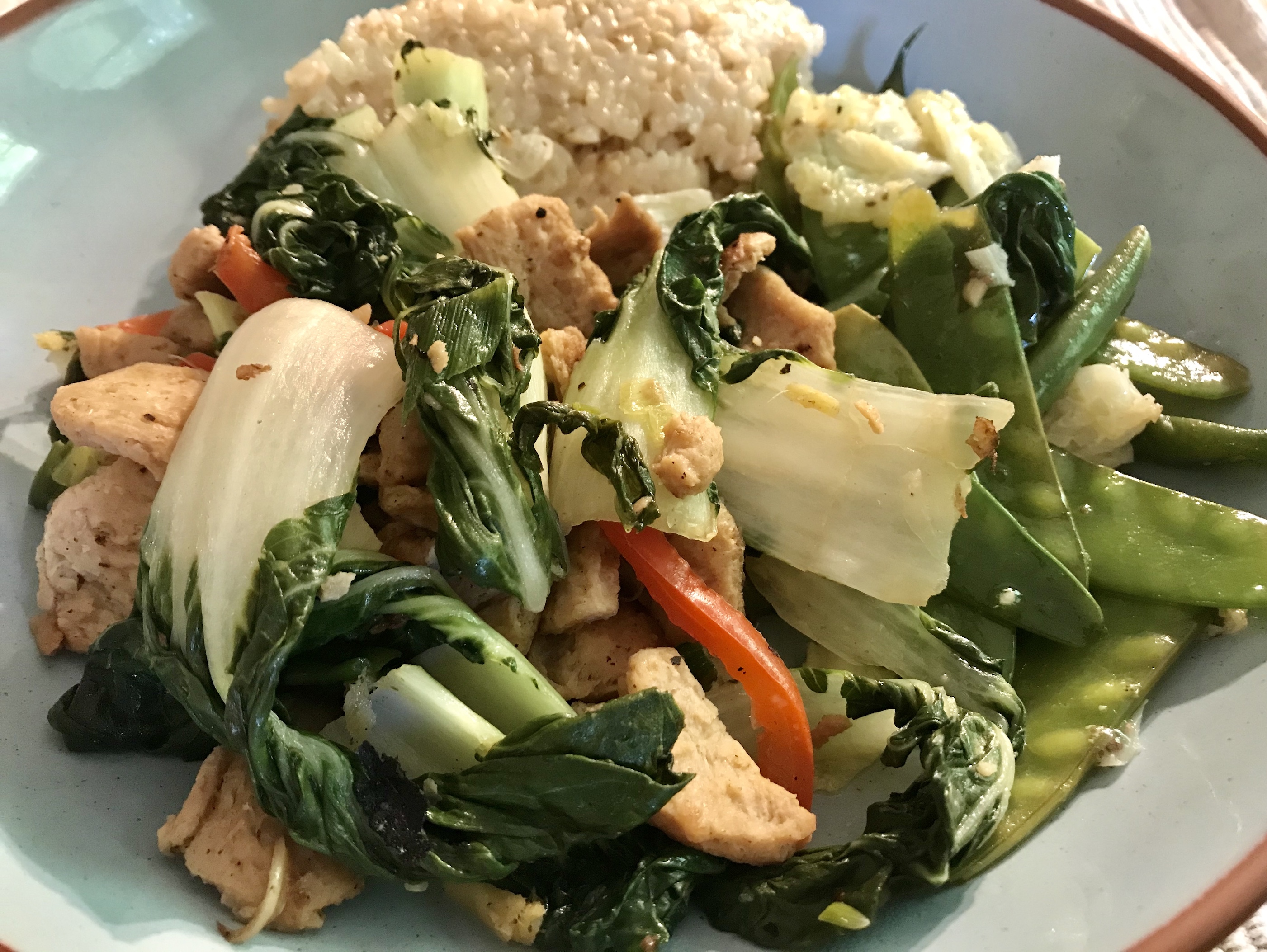
My tips for improving digestion are based on our own trial and error, but also our combined knowledge in both Chinese and Ayurvedic medicine. Both of these health care systems recommend different foods to eat or avoid, based on one's individual constitution, and pattern of disharmony or disease.
I briefly highlight a few of the different treatment strategies for the three main doshas above. As there is much more that can be discussed on the topic of improving digestion, including constipation, and malabsorption or poor assimilation of foods relating to disorders of the small intestine, I'll write more in future posts.
These dietary recommendations are just suggestions. Each person will need to do their own experiments.
For a more customized approach, contact us for a by phone consultation, or full health coaching package. Or find a qualified Chinese medicine practitioner specializing in Chinese food therapy in your area.
Without going too much more detail about Ayurvedic medicine and the three main doshas here, I'll briefly explain that each dosha is associated with two of the elements, similar to Chinese Five Elements Theory. Vata is associated with air + ether. The primary area Vata lives in the body is in the gut, specifically the colon. Air is associated with wind, hence gas from the wind, or air + ether elements.
Whether or not one has a predominant Vata dosha type, either dry constipation or gas and bloating is considered a Vata disorder. Foods and herbs which help pacify an excess Vata are generally recommended, with consideration given to the person's unique constitutional needs, some of which were outlined above.
Be sure to also read my corresponding blog post to see our own recent meals and dietary revisions for improving digestion and to minimize gas and bloating. It's a work in progress, and can take time, so be patient.
Let me know if you try any of the these suggestions, or if you have suggestions of your own.
Learn more...
>>>Learn more about Macrobiotics, including My Amazing Macrobiotic Weight Loss
>>>Learn more about Chinese Five-Elements Theory & Seasonal Eating
>>>Plant-Based Meal Prep / Batch Cooking Tips & Recipes
>>>Grab a copy of my FREE Macrobiotic E-Books



